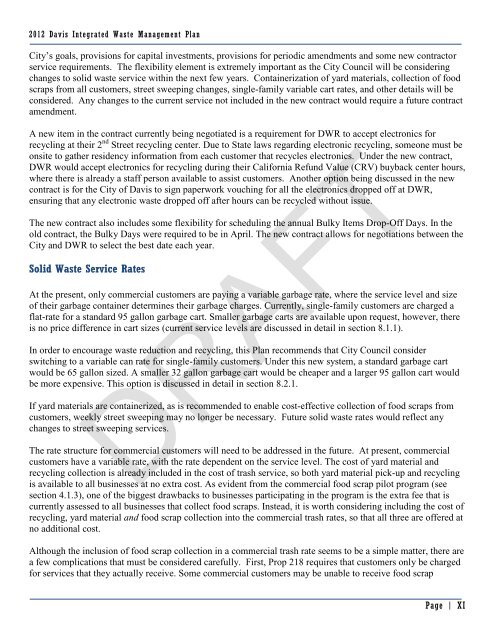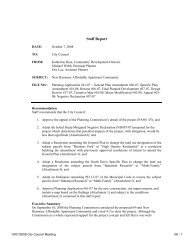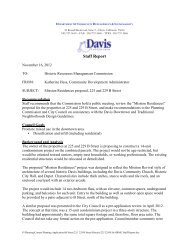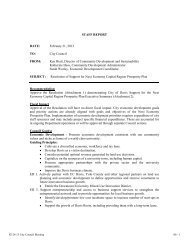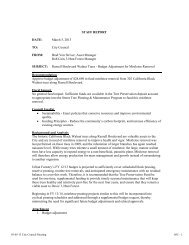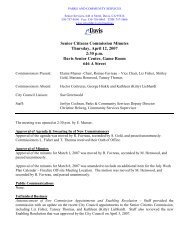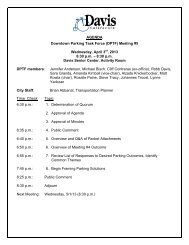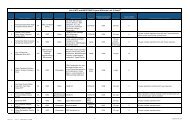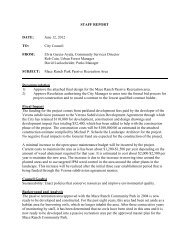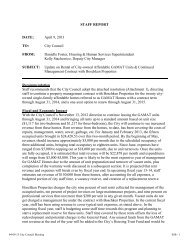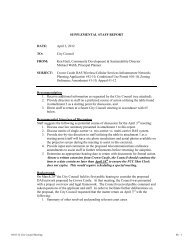10 Draft Integrated Waste Management Plan - City Council - City of ...
10 Draft Integrated Waste Management Plan - City Council - City of ...
10 Draft Integrated Waste Management Plan - City Council - City of ...
Create successful ePaper yourself
Turn your PDF publications into a flip-book with our unique Google optimized e-Paper software.
2012 Davis <strong>Integrated</strong> <strong>Waste</strong> <strong>Management</strong> <strong>Plan</strong><br />
<strong>City</strong>’s goals, provisions for capital investments, provisions for periodic amendments and some new contractor<br />
service requirements. The flexibility element is extremely important as the <strong>City</strong> <strong>Council</strong> will be considering<br />
changes to solid waste service within the next few years. Containerization <strong>of</strong> yard materials, collection <strong>of</strong> food<br />
scraps from all customers, street sweeping changes, single-family variable cart rates, and other details will be<br />
considered. Any changes to the current service not included in the new contract would require a future contract<br />
amendment.<br />
A new item in the contract currently being negotiated is a requirement for DWR to accept electronics for<br />
recycling at their 2 nd Street recycling center. Due to State laws regarding electronic recycling, someone must be<br />
onsite to gather residency information from each customer that recycles electronics. Under the new contract,<br />
DWR would accept electronics for recycling during their California Refund Value (CRV) buyback center hours,<br />
where there is already a staff person available to assist customers. Another option being discussed in the new<br />
contract is for the <strong>City</strong> <strong>of</strong> Davis to sign paperwork vouching for all the electronics dropped <strong>of</strong>f at DWR,<br />
ensuring that any electronic waste dropped <strong>of</strong>f after hours can be recycled without issue.<br />
The new contract also includes some flexibility for scheduling the annual Bulky Items Drop-Off Days. In the<br />
old contract, the Bulky Days were required to be in April. The new contract allows for negotiations between the<br />
<strong>City</strong> and DWR to select the best date each year.<br />
Solid <strong>Waste</strong> Service Rates<br />
At the present, only commercial customers are paying a variable garbage rate, where the service level and size<br />
<strong>of</strong> their garbage container determines their garbage charges. Currently, single-family customers are charged a<br />
flat-rate for a standard 95 gallon garbage cart. Smaller garbage carts are available upon request, however, there<br />
is no price difference in cart sizes (current service levels are discussed in detail in section 8.1.1).<br />
In order to encourage waste reduction and recycling, this <strong>Plan</strong> recommends that <strong>City</strong> <strong>Council</strong> consider<br />
switching to a variable can rate for single-family customers. Under this new system, a standard garbage cart<br />
would be 65 gallon sized. A smaller 32 gallon garbage cart would be cheaper and a larger 95 gallon cart would<br />
be more expensive. This option is discussed in detail in section 8.2.1.<br />
If yard materials are containerized, as is recommended to enable cost-effective collection <strong>of</strong> food scraps from<br />
customers, weekly street sweeping may no longer be necessary. Future solid waste rates would reflect any<br />
changes to street sweeping services.<br />
DRAFT<br />
The rate structure for commercial customers will need to be addressed in the future. At present, commercial<br />
customers have a variable rate, with the rate dependent on the service level. The cost <strong>of</strong> yard material and<br />
recycling collection is already included in the cost <strong>of</strong> trash service, so both yard material pick-up and recycling<br />
is available to all businesses at no extra cost. As evident from the commercial food scrap pilot program (see<br />
section 4.1.3), one <strong>of</strong> the biggest drawbacks to businesses participating in the program is the extra fee that is<br />
currently assessed to all businesses that collect food scraps. Instead, it is worth considering including the cost <strong>of</strong><br />
recycling, yard material and food scrap collection into the commercial trash rates, so that all three are <strong>of</strong>fered at<br />
no additional cost.<br />
Although the inclusion <strong>of</strong> food scrap collection in a commercial trash rate seems to be a simple matter, there are<br />
a few complications that must be considered carefully. First, Prop 218 requires that customers only be charged<br />
for services that they actually receive. Some commercial customers may be unable to receive food scrap<br />
Page | XI


